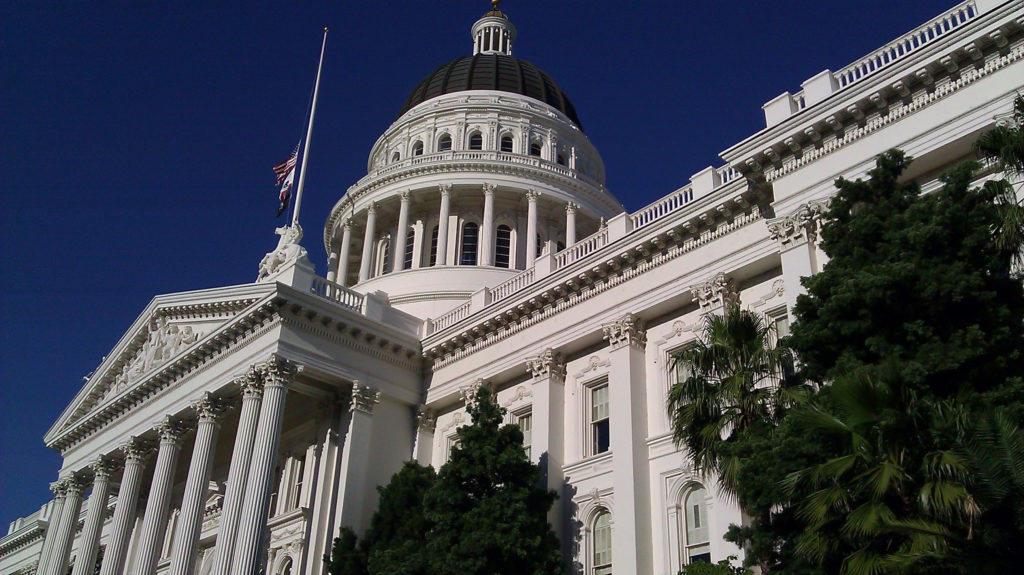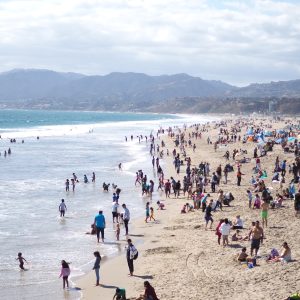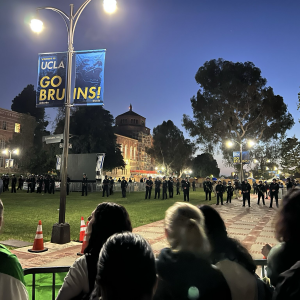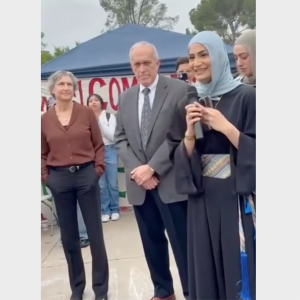 View Winners →
View Winners → New Laws: The Good, the Bad and the Silly for 2020


California capital in Sacramento. – Courtesy photo
By Terry Miller
Let’s face it; the majority of us here in California rely, perhaps a little too much, on our motor cars — despite the advancements in public transport. So it’s only natural that we commence the new laws with those that directly apply to the DMV.
But before we get there, here are a few strange and somewhat silly laws, apparently on the books, to hopefully make the more serious laws palatable:
- In Arcadia, peacocks have the right of way to cross the street, this includes crossing driveways.
- It is illegal for animals to mate within 1,500 feet of a school, saloon or place of worship.
- It is illegal for a Californian to ride their bicycle through a public swimming pool.
- In Long Beach, it is illegal to curse on a mini-golf course.
- In Blythe, it is illegal to wear cowboy boots unless you own two or more cows.
- It is illegal for autonomous vehicles to drive over 60 miles per hour.
- It is illegal for women to drive vehicles while wearing a housecoat.
- Walking an elephant down Market Street in San Francisco is illegal, unless the elephant is on a leash. OK, you have been duly warned.
Now on to serious business and we will begin with the upcoming federal enforcement date for the REAL ID.
Starting Oct. 1, 2020, the U.S. Department of Homeland Security will require a valid passport or other federally approved document, like a REAL ID driver license or identification card, to board flights within the United States and access secure federal facilities and military bases.
“We urge Californians to apply for their REAL ID at the time of their renewal or their earliest convenience – so they are fully prepared by Oct. 1, 2020,” DMV Director Steve Gordon said.
To apply for a REAL ID, Californians must visit a DMV office and bring the following documents:
- One proof of identity* – original or certified (examples: valid passport, birth certificate). *Legal name change document(s) if name on proof of identity is different from the name on the other documents
- One proof of Social Security number.
- Two proofs of California residency – paper copies (examples: utility bill, bank statement).
Visit REALID.dmv.ca.gov for a complete list of acceptable documents and a helpful quiz to determine if you need a REAL ID. Customers are strongly encouraged to fill out the online application before their office visit at eDLapp.dmv.ca.gov.
More new state laws or changes to existing law that take effect Jan. 1, 2020 and affect drivers:
- Ban on Selling DMV Appointments (AB 317, Diep): Makes it unlawful for any person to sell, or offer for sale, an appointment with the DMV. (Editor’s note – if you were lucky enough to actually get a DMV appointment before 2030, why on earth would you sell it?)
- Clean Air Vehicle Decals for Low-Income Californians (SB 957, Lara – 2018): Allows certain used vehicles that were previously issued a green or white clean air vehicle decal to receive another clean air vehicle decal, granting access to high occupancy vehicle lanes until Jan. 1, 2024. To qualify, the vehicle must have a new owner whose income is 80 percent or less than the statewide medium income.
- Repeal of Driver License Actions Based on Non-Driving Offenses (SB 485, Beall): Eliminates courts’ authority to suspend, revoke, restrict or order the DMV to delay the driving privilege of a person convicted of prostitution, vandalism or other non-driving offenses.
- Extension of Pilot Program for Registration Alternatives (AB 1614, Gipson): Extends the pilot program evaluating the use of alternatives to license plates and registration cards until Jan. 1, 2021.
- Driver License Extension for Members of U.S. Foreign Service and Spouse (SB 267, Wieckowski): Extends the validity of a driver license for a person in the United States Foreign Service or their spouse for the period of their service and up to 30 days following their return to California.
- Operation of Motorized Scooters (AB 1810, Committee on Transportation): Removes motorized scooters from the list of vehicles requiring a Class M2 driver license or permit, thus allowing a person with a valid driver license or permit of any class to operate a motorized scooter.
- Rules for Passing Waste Service Vehicles (AB 2115, Santiago – 2018): Requires a driver approaching or passing a stopped waste service vehicle to make a lane change into an available lane adjacent to the waste service vehicle and pass at a safe distance, with due regard for safety and traffic conditions, except as specified.
- New Color for Clean Air Vehicle Decals (AB 544, Bloom – 2017): As previously announced, AB 544 created a new program to grant low-emission vehicles and transitional zero-emission vehicles access to high-occupancy vehicle (HOV) lanes for an approximate four-year period, regardless of the vehicle occupancy level. The DMV will issue orange decals in 2020 that grant access to HOV lanes until Jan. 1, 2024.
In his first year in office, California Governor Gavin Newsom signed several laws impacting California employers. A summary of some of the key new laws follows.
AB 5 – Worker Status: Employees and Independent Contractors (Effective Jan. 1, 2020)
Of all the bills that Governor Newsom signed in 2019, AB 5 was by far the most widely reported and will have the most wide-ranging repercussions for companies that rely on independent contractors in California. This will affect Uber and Lyft drivers as well as media (newspaper/online photojournalists).
AB 9 – Employment Discrimination: Limitation of Actions (Effective Jan. 1, 2020)
AB 9 is another bill that changes the employment landscape in California. Under existing law, an employee who claims to be aggrieved by an alleged unlawful practice has to file a verified complaint with the Department of Fair Employment and Housing within one year from the date upon which the unlawful practice occurred.
AB 9 extends the one-year period to three years for complaints alleging employment discrimination and harassment prohibited by the California Fair Employment and Housing Act (FEHA). Claims that have lapsed are not revived by this bill.
AB 51 – Employment Discrimination: Enforcement (Effective Jan. 1, 2020)
AB 51 will have wide-ranging repercussions for employers that rely on arbitration agreements in California. By way of background, under existing laws, an employer can generally require an employee to enter into an arbitration agreement, including as a condition of employment.
AB 51 essentially bans mandatory arbitration agreements and prohibits employers from requiring any applicant for employment or any employee to waive any right, forum, or procedure for a violation of any provision of the FEHA or other specific statutes governing employment (such the Labor Code) as a condition of employment, continued employment, or the receipt of any employment- related benefit. This means that, except in certain limited circumstances, AB 51 essentially bans arbitration agreements in California. In addition, AB 51 provides that even an opt-out of a waiver provision or requiring employees to take any affirmative action in order to preserve their rights are deemed a condition of employment and prohibited.
AB 51 also prohibits employers from threatening, retaliating or discriminating against, or terminating any applicant for employment or any employee because of the refusal to consent to the waiver of any right, forum, or procedure for a violation of specific statutes governing employment.
AB 673 – Failure to Pay Wages: Penalties (Effective Jan. 1, 2020)
In addition to existing penalties that an employee may recover for an employer’s failure to timely pay an employee’s wages, AB 673 authorizes the affected employee to bring an action to recover statutory penalties against the employer to recover unpaid wages. This bill provides that for any initial violation, the employer is subject to $100 for each failure to pay each employee. For each subsequent violation, or any willful or intentional violation, the employer is subject to $200 for each failure to pay each employee, plus 25 percent of the amount unlawfully withheld.
AB 1223 – Living Organ Donation (Effective Jan. 1, 2020)
Under existing law, private employers with 15 or more employees must permit an employee to take a leave of absence with pay, not exceeding 30 business days in a one-year period, for the purpose of organ donation.
AB 1223 requires such employers to grant an employee an additional unpaid leave of absence, not exceeding 30 business days in a one-year period, for the purpose of organ donation. The one-year period is measured from the date the employee’s leave begins and shall consist of 12 consecutive months
SB 83 – Paid Family Leave (Effective July 1, 2020)
Under SB 83, wage replacement benefits under the California Paid Family Leave (PFL) increases from 6 weeks to 8 weeks beginning July 1, 2020.
SB 188 – Discrimination: Hairstyles (Effective Jan. 1, 2020)
The FEHA protects against discriminatory employment practices, including hiring, promotion, and termination of employment based on certain protected characteristics, including race, unless based on a bona fide occupational qualification or applicable security regulations. Under SB 188, a.k.a. the “CROWN Act,” the definition of “race” includes traits historically associated with race, including, but not limited to, hair texture and protective hairstyles, which in turn include, but are not limited to, such hairstyles as braids, locks, and twists.
SB 778 – Sexual Harassment Training: Requirements (Effective Aug. 30, 2019)
As a result of legislation passed in 2018 (SB 1343), employers who employ five or more employees, including temporary or seasonal employees, were required to provide two hours of sexual harassment training to all supervisors and managers, and at least one hour of sexual harassment training to all non-supervisory employees, by Jan. 1, 2020, and once every two years thereafter.
SB 778 – signed as an emergency measure on Aug. 30, 2019 – modifies and extends the compliance deadline to Jan. 1, 2021. This bill also requires that new nonsupervisory employees be provided the training within six months of hire and new supervisory employees be provided the training within six months of the assumption of a supervisory position.
Finally, this bill provides much needed clarification that an employer who provided this training and education in 2019 is not required to provide it again until two years thereafter. This bill amends sections 12950.1 of the Government Code.5






































































































